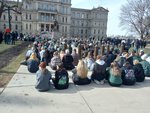

In 2021, Lansing Community College locked down its downtown campus buildings. Access was limited to those holding a card issued to students, faculty and staff.
LCC made the quiet move, President Steve Robinson said, “in response to fewer people in the buildings and mitigating against those threats where you can say, ‘It can’t happen here,’ but it can happen anyway.”
“Those threats” came to pass at Michigan State University two Mondays ago, and now MSU is deciding whether to follow suit.
The system used by LCC not only limits access to campus buildings. It also allows security officials to remotely lock down not just certain buildings but also certain hallways, effectively isolating a threat on campus, allowing law enforcement to marshal a response while protecting lives.
“We have the ability to restrict building access on campus,” MSU deputy spokesperson Dan Olson wrote in an email. “The question is, we are a public university, and we have a history of being a public campus and welcoming the community to our campus. And so, long term, we have to be having those conversations about what do we want to do and what do we want to do from a safety and security measure?”
“We’ll be having those conversations and incorporating community, students, faculty as part of that to understand what our community needs are and what will help them feel most safe. But also trying to work through that process into the future.”
The mass shooting was not the first time a gun on campus was a concern for students. City Pulse reported last August on a 2021 incident involving an 18-year-old freshman who was found in possession of firearms, a homemade taser and knives after weeks of escalating and concerning behavior.
Last fall, MSU officials announced plans to consolidate the university’s 2,000 camera feeds into a centralized facility that would be monitored 24 hours a day.
Olsen said contractors were expected on campus last week to review all the systems and provide bids on the software and hardware that will knit the disparate systems composing the current network into a cohesive whole. The centralized system would have sped up circulating images of mass shooter Anthony McRae. It took just over three hours for detectives to comb through video to identify him. Once released, the photo quickly led to a tip from a Lansing resident who saw McRae miles away. When police confronted him, he killed himself.
Dion Bennett graduated from MSU in May 2022. He is living in East Lansing and was frustrated by the university’s delay in addressing video surveillance issues.
“The cameras were supposed to be updated. I’m hoping that this will wake them up for them to get to it, things of that nature,” he said.
In addition to the central surveillance room, MSU has radio frequency identification (RFID) chip cards for access to buildings on campus, such as residence halls. When the new central security hub is complete, Olsen said MSU will be able to remotely lockdown facilities across campus.
Like LCC, other universities across the country have moved toward more restrictive security measures, according to their spokespeople or websites. Those security measures include centralized systems like MSU’s as well as RFID chip technology limiting access to campus buildings.
Heather Bow, 20, and her friend Cydney Jenkins, 19, talked to City Pulse as an estimated 1,000 students sat on the lawn of the Capitol Monday demanding changes to laws around guns to stop mass shootings.
Jenkins said she never felt unsafe at MSU. In fact, most Mondays would have found her in the MSU Union building, where the shooter killed one.
“I never felt unsafe there. I loved it there,” she said.
Still, Jenkins, who helped organize a March for Our Lives protest five years ago, at 14, following the massacre at Parkland High School in Florida, said locking down buildings on campus is not necessarily the answer to stopping an active shooter.
“I think it takes away a lot of freedom, but I don’t think it’d be super effective. On our campus, we’re taught to be kind. We’re taught to hold doors open for people, to not project an image of what a student should be,” she said, as Bow concurred. “So to me, it wouldn’t be out of line for another student to let somebody in that they see outside. It would be quite simple just to wait for somebody to come by, swipe a card and say, oh, come on in. Sorry, let me hold this door open for you. So I don’t know if it would be an effective solution to that.”
She conceded that if a stranger was waiting for that opportunity, it might give someone pause enough to call law enforcement out of concern.
Jenkins said gun control legislation is important, such as “red flag laws’’ that would allow family and law enforcement to seek a temporary order to seize firearms from a person who may be a threat to themselves or others.
But with the security of the bucolic campus shaken to its core by the shootings, Bow admitted she is not sure what, if anything, will make her feel safe on campus again.
“I don’t even know what I need,” she said. “I don’t know how you can even start to secure a building like that, a building that’s supposed to be an open and safe place for students. I don’t know where the university could even begin to start.”
– TODD HEYWOOD
Support City Pulse - Donate Today!
Comments
No comments on this item Please log in to comment by clicking here